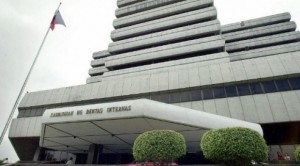MANILA, Philippines—A Manila judge and a court employee representing their respective professional associations have sought relief from the Supreme Court to stop the Bureau of International Revenue (BIR) from collecting taxes out of their allowances and benefits, citing the preservation of judicial independence protected by no less than the Constitution.
In a petition for certiorari and prohibition filed earlier this week, Manila Regional Trial Court Judge Armando Yanga and Branch 15 court interpreter Cristina Carmela Japzon impleaded BIR Commissioner Kim Henares and asked the high court to nullify for grave abuse of discretion Revenue Memorandum Order 23-2014, which she introduced on June 20.
BIR’s RMO 23-2014 imposes taxes on allowances and fringe benefits of government employees on top of the 32 percent withholding tax on their basic pay, mandates local government officials to collect and remit these taxes, and imposes penalties to state agents who fail to withhold and promptly remit these collections to the national government. Henares earlier said the measure did not seek to impose new taxes.
Yanga filed the pleading both in his personal capacity and as president of the RTC Judges Association of Manila, and Japzon also in her personal capacity and as president of the Philippine Association of Court Employees (Manila Chapter).
“The Petitioners respectfully maintain that the grant of special allowances to justices, judges and all other positions in the Judiciary with the equivalent rank of Justices of the Court of Appeals and of the Regional Trial Court, is intended not only to guarantee the institutional independence of the Judiciary, but also the decisional independence of the individual Justice and Judges,” read the 48-page petition filed on Tuesday and released late Wednesday.
The petitioners further cited American jurisprudence on such taxation, saying: “The current unjustified attacks [on] the Judiciary undermines its independence and to allow the continued taxation of the compensation of its members further erodes that independence, an independence that promotes the public weal by giving the judges that independence which makes an impartial and courageous discharge of the judicial functions.”
Seeking an immediate temporary restraining order, the petition cited how the Constitution enshrined the protection of judicial independence and argued that the RMO “should not apply to members of the judiciary…even if we are to assume for the sake of argument that [it is] a valid act.”
“The obvious intent of the foregoing Constitutional provisions (protecting judicial independence) is to ensure the independence of the judiciary. To impose withholding tax on the items subject of RMO 23-2014… is to weaken that independence. If the items are part of compensation, as the RMO now proposes, then it should be part of the salary which, by constitutional mandate, cannot be decreased,” read the petition.
The petition is the second to be filed against RMO 23-2014 this month, parallel to the legal action that 12 organizations representing an estimated 300,000 government workers filed on Aug. 6 against Henares and Finance Secretary Cesar Purisima.
The high court en banc just ordered Henares and Purisima on Aug. 19 to comment on the first petition within 10 days of receiving notice.
Like the earlier action, the second petition said the assailed RMO was illegal as it was not approved by the finance department and withheld undue taxes from allowances and bonuses rendered tax exempt by the National Internal Revenue Code (NIRC) of 1997, among others.
These include special allowances for justices and justices “that guarantees the decisional indepence of judges and justices,” the additional cost of living allowance provided under the Judicary Development Fund (JDF) and several allowances and benefits from where taxes should not be withheld, per the NIRC.
Employees’ grocery allowance, clothing allowance, emergency economic allowance, year-end bonus, cash gift, loyalty cash award, Christmas allowance, anniversary bonus were also among those that the RMO would tax, the petitioners said.
Henares’ measure also collects taxes on funds for “extraordinary and miscellaneous expenses” released to government agencies to cover official meetings and other functions, public relations and civic activities, memberships to national professional organizations, subscriptions to professional and technical journals and related magazines and procurement of extra office equipment and supplies.
The petitioners argued that such funds have been tax exempt under the Commission on Audit’s (COA) Circular 2012-001.
“We respectfully submit that this plainly illegal act should be struck down. RMO No. 23-2014 deserves no less than a categorical declaration of its nullity and should forthwith be annulled and declared null and void, as it was obviously issued with grave abuse of discretion amounting to lack or excess of jurisdiction,” said the petition.
The petition was filed amid the continuing rift between the Executive and the Judiciary following the Supreme Court’s decision to strike down Malacañang’s Disbursement Acceleration Program (DAP) as unconstitutional.
In Congress, President Aquino’s allies have initiated moves to abolish the JDF. Last month meanwhile, Henares complained of the high court’s rejection of her requests for copies of the justices’ Statements of Assets, Liabilities and Net Worth as part of a tax investigation.
The high court has maintained that the JDF, a special fund created in 1984 via Presidential Decree 1949, has been disbursed without irregularities and subjected to regular COA audits. It has also reiterated the transparency of magistrates, who have granted access to their SALNs to members of the media, students and others who satisfied the requirements of application.
RELATED STORIES
Small stores, farmers, fishers, others should pay taxes—BIR
Doctors slam BIR ad: We’re not tax cheats
